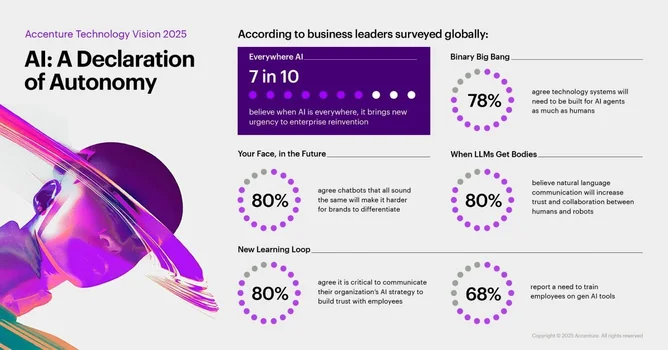Technology Magazine explores Accenture’s 25th edition of its ‘Technology Vision’ which provides insights on the future of AI-powered autonomy.
Entering into a new era of digitalisation, the rise in AI adoption and its ability to continuously learn is driving new levels of autonomy across organisations. Today, leaders are beginning to trust in its performance.
The future is being shaped by AI-powered autonomy
Research conducted by Accenture reveals that 69% of executives believe that AI brings new urgency to reinvention and how technology systems and the processes it enables are designed, built and operated.
Harnessed as a technology development partner, AI is expected to increasingly act as a personal brand ambassador, power robotic bodies in the physical world, and foster a new symbiotic relationship with people to bring out the best in each other.
Do people trust AI?
Essential to having as broad and positive an impact as anticipated, people will need to be able to trust AI.
Accenture believes that this lies in digital systems and AI models being more accurate, predictable, consistent and traceable, over and above the responsible use of AI.
77% of executives believe that the true benefits of AI will only be possible when built on a foundation of trust. In addition, 81% agree that trust strategies must evolve in parallel with any technology strategy.
“Advancements in digitising knowledge, new AI models, agentic AI systems and architecture enable enterprises to create their own unique cognitive digital brains,” said Karthik Narain, Group Chief Executive of Technology and CTO at Accenture.
He adds: “While conventional technologies have long supported pre-determined business needs, this is a generational moment of transition. The autonomy created by these generalised AI systems can help organisations be more dynamic and intention-driven than ever.
“It will allow leaders to rethink how digital systems are designed, how people work and reinvent how they create products and interact with customers. But trust underpins it all, as systems will only ever be as autonomous as they are trustworthy.”
The potential impact of Gen AI
Already Gen AI coding assistants are elevating the role of developer to systems engineer, accelerating the democratisation of code and digitisation of businesses.
Accenture reports that the rise of custom systems as a result of gen AI-assisted software development and the advancement of AI agents is shifting the industry from static application architecture to intention-based framework and agentic systems.
As these multi-agent systems become more capable, adaptive and personalised, this technology will inspire greater diffusion through enhanced competence. These systems will grow to manage processes and entire functions from streamlining travel to optimising inventory.
Separately, while many organisations are racing to make AI a new customer touch point, 80% of executives believe that LLMs and chatbots could give every brand a similar voice. However, 77% agreed that this could be resolved by proactively building personalised AI experiences and injecting distinct brand elements through its digital brain.
Accenture also expects to see generalist robots emerging over the next decade bringing more AI autonomy into the physical world. The consultant predicts that it will be possible for introductory general-purpose robots to become specialist robots, learning new tasks very quickly.
8% of executives believe that robots collaborating with people and continuously learning from those interactions will increase trust and collaboration between people and robots.A key priority for 80% of leaders in the years ahead will be ensuring a positive relationship between people and AI, starting with communicating the strategy and bringing employees into the process.
“Our 25th Technology Vision gives leaders a look into what’s ahead when AI continuously learns, acts autonomously with and on behalf of people and pushes enterprises and the people who use it into new and exciting ways to continuously reinvent,” said Julie Sweet, chair and CEO at Accenture.
“But unlocking the benefits of AI will only be possible if leaders seize the opportunity to inject and develop trust in its performance and outcomes in a systematic manner so businesses and people can unlock AI’s incredible possibilities.”



